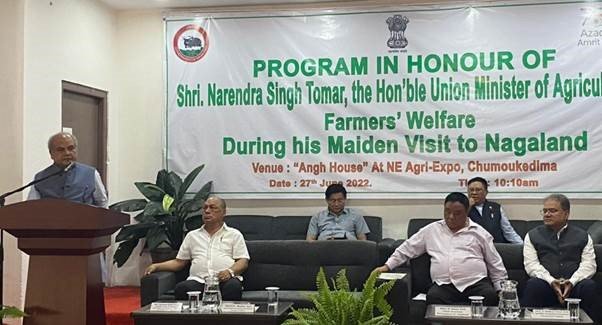India’s processed foods and agri export soar by 25% to $13,771 Mn
Fruits and vegetables, cereals, livestock, and processed foods witnessed a spike in exports this fiscal
Exports of agricultural and processed food products have increased by 25 per cent within six months of the current Financial Year 2022-23 (April-September) in comparison to the corresponding period of FY 2021-22. According to the provisional data released by the Directorate General of Commercial Intelligence and Statistics (DGCI&S), the overall export of agricultural and processed food products has witnessed a growth of 25 per cent during April-September 2022.
The overall export of Agricultural and Processed Food Export Development Authority (APEDA) products increased to $13,771 million in April-September 2022 from $11056 million over the same period of the last fiscal year. The initiatives taken by the Ministry of Commerce and Industry through APEDA have helped the country achieve 58 per cent of its total export target for the year 2022-23 within six months of the current fiscal.
For the year 2022-23, an export target of $23.56 billion has been fixed by APEDA for the agricultural and processed food products basket and export of $13.77 billion have already been achieved in these six months of the current fiscal. As per the DGCI&S provisional data, processed fruits and vegetables recorded a significant growth of 42.42 per cent (April-September 2022), while fresh fruits registered 4 per cent growth as opposed to corresponding months of the previous year.
Also, processed food products like cereals and miscellaneous processed items reported a growth of 29.36 per cent compared to the first six months of the previous year.
In April-September, 2021, fresh fruits were exported to the tune of $ 301 million which increased to $313 million in the corresponding months of the current fiscal. Exports of processed F&V jumped to USD 1024 million in six months of the current fiscal from $719 million in the corresponding months of the previous year.
The export of pulses has witnessed an increase of 144 per cent in Q2 of the current fiscal in comparison to the corresponding months of the last fiscal as the export of lentils increased from $ 135 million (April-September 2021-22) to $ 330 million (April-September 2022-23).
Basmati Rice exports witnessed a growth of 37.36 per cent in six months of FY 2022-23 as its export increased from $ 1660 million (April-September 2021) to $ 2280 million (April-September 2022), while the export of non-Basmati rice registered a growth of 8 per cent in Q2 of current fiscal. Its export increased to USD 3207 million in six months of the current fiscal from $ 2969 million in the corresponding months of the previous year.
The export of meat, dairy and poultry products increased by 10.29 per cent and the export of other cereals recorded a growth of 12.29 per cent in six months of the current fiscal. The poultry products alone registered a growth of 83 per cent as its export rose to $57 million within the half-year bracket of the current fiscal from $31 million recorded for the corresponding months of the previous year.
Similarly, dairy products recorded a growth of 58 per cent as its export rose to $ 342 million in Q2 of the current fiscal from $216 million in Q2 of the previous year.
Wheat export registered an increase of 136 per cent in Q2 of the current fiscal. Wheat export rose to $1487 million in April-September 2022 from $630 million in April-September 2021.
Other cereals’ export increased from $ 467 million in April-September 2021 to $525 million in April-September 2022 and the export of livestock products increased from $ 1903 million in April-September 2021 to $ 2099 million in April-September 2022.
Fruits and vegetables, cereals, livestock, and processed






